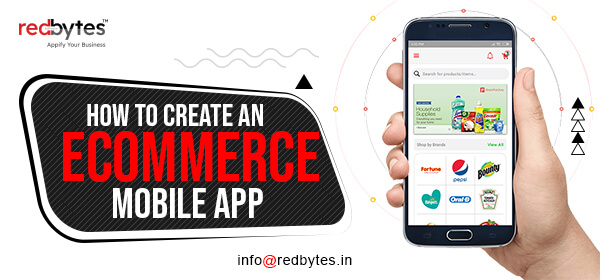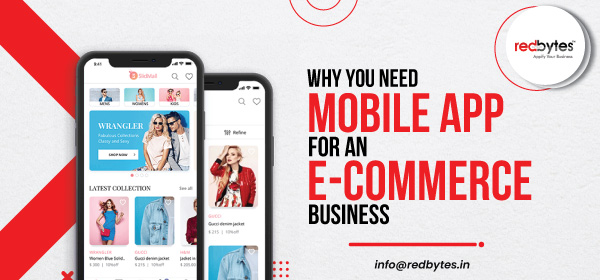In this present era, e-commerce business has totally transformed the Internet into an enormous marketplace where new emerging start-up companies can grab an auspicious opportunity to market and sell their products. The main purpose of e-commerce mobile apps is to offer a positive buying experience to their users to gain customer loyalty and increase rapid revenue channels.
Though e-commerce business is fully dependent on website and mobile, users who are digitally literate nowadays prefer online shopping using mobile apps rather than website. This is the prime reason why every business, new or established, should look to having an e-commerce mobile app for acquiring significant growth in less time.
Read Also: How Much Does It Cost To Create A Shopping Website
So, here we are going to discuss the must-haves that are required for the success of developing an e-commerce mobile app:
1) Thorough Market Analysis
At the core of the success of any ecommerce mobile app lays the depth of research and analysis of market and customer behavior pattern. Long before you start developing an app, you must first start with determining the buyer persona for your business in order to make it relatable.
Infact, try to be through the market trends about ecommerce mobile app development and know the people who are likely to be your customers. After all, it is your target audience that will measure the performance and the content of your app.
2) Select the Right Technology
The technology you select can make or break the future business scope of your ecommerce app. Consider the elements of budget, popularity, available resources as top source. Even go for recommendations from developers to choose the right CMS, Framework and database system along with the programming languages for the back-end and front-end coding.
Based on the device, you can also develop Hybrid apps that function across available platforms (iOS and Android) saving you good amount of time later for marketing.
3) Uncomplicated Design
The design of the e-commerce store will determine the behaviour and perception of the buyers. The app interface should be easy to understand as the users have an attention span of less than 8 seconds. The creation of complicated designs should be avoided and the user interface should be simple in nature as this will enhance the user experience.
The shape and symbol of the app icon should be unique in nature so that it easily recognised by the users. Also, the name of the app should be short according to the rule of user interface.
4) Catchy images
According to studies, visual information is normally processed 60,000 times faster than text by the users. So it is essential to provide appealing images for the communication of the brand as well as the product.
Read more : How To Make Ecommerce Website Like Amazon
Image-based search options is also another option that can be incorporated to the app as users with language difference will have no issues during product searching. For an improved user experience, the app designers must choose the catchy themes or colours during the development of the app.
5) Security
Security can be considered as a vital part during the development of the e-commerce mobile app. This is mainly because a lot of personal information is asked to the users like details of bank account, info of credit/debit card, address, etc.
The security should be checked during every step of the development for avoiding any kind of loophole. For this encryption and authentication technology can be used which can protect the app code and the entire process.
6) Simple Navigation
The screen size and the content should always be considered during the development of the e-commerce mobile app as the screens of mobile phone have limited space. Therefore, the content should be made readable and clear.
The navigation should be responsive and flawless so that it can automatically fit into any resolution and screen size. It should also be simple and user friendly so that the products or brands are displayed to the users in a very remarkable manner. Due to this a responsive design should be chosen that can automatically fit into any resolution and screen size.
7) Multiple Payment Options
You must consider carefully all the possible scenarios where customers need a little more from you to give you a positive sale. If a customer encounters an issue with payment options, you will miss out on a big potential buyer. When you have customers who have their items put in the cart, your app must direct them towards all the available options for making quick transactions.
In order to keep that customer shopping from your ecommerce app, integrate the widely preferred payment methods in your app. Apart from credit card, debit card, net banking, and e-Wallets, you can also nudge them gently to use your app’s in-built wallet sometimes.
8) Social Media Integration
The social media sites should be integrated in the e-commerce mobile app as this will allow the users to connect directly with your app using their social media profile without having to register to make an account. Basically, users dislike the registration process and therefore they should be given the option to connect directly making the process easier.
With the help of social media, the users can share their shopping experience and this will eventually boost the reputation of your business by gaining a good amount of followers. Due to its validated reputation, social media integration can also helps your business achieve fair credibility, visibility and exposure among the target customers.
9) Push Notifications
Push notification is a vital feature that should be added during the creation of an e-commerce mobile app as this can get customers to dedicate attention to your business. It is with the help of push notifications that the customer engagement is improved as this keeps them informed – and interested – about the discounts, new attractions, coupons, offers and promotions which attracts them for more.
Read more : 24 Best Online Shopping Apps
Moreover, the meaningful push messages, improve profit making via up selling and cross selling. The push messages with various offers should appear on user’s device screen without opening the app.
10) Wishlist
Customers choose to drop the items to a wish list for many reasons. May be to compare the prices or specifications with those offered by other ecommerce apps, or because they head towards the end of the month, waiting for salary that is still a week away.
Somehow at times, people might not be willing to lose what they have discovered on your app and seek a system of saving it in your app with intent to buy it later. So, wish list is one of the best way to offer customers a window of wait time and retain sales by allowing them to save products they wish to buy later.
11) Easy Checkout
Checkout process is the critical step to avoid the disaster of cart abandonment. The level of speed, clarity and simplicity offered by the checkout pages can determine the final action of customers. Give users multiple options of transactions. The best alternative should be an inbuilt mobile wallet system that will automatically smoothen up the process.
Give customers a glimpse of add-on products that are similar to what they are looking to . Be clear about hidden shipping costs and the length of the process. Build the page in such a way that customers won’t need to fill the details every time they visit the store.
12) Post-Development Exercises
The creation of the successful e-commerce app should not stop after its release. In fact, you should be more active about making your app noticeable and visible by continuously marketing it on many social portals as well as via emails.
Read more : How To Create a Marketplace Mobile App?
Also, to provide the users with a delightful experience, make sure you constantly update the app with frequent improvements and innovations since customers have whimsical mindset to switch to another app that has more enhanced user-friendly attitude.
Conclusion
Success in the arena of e-commerce is not a facilegoal; however, using the right tools, techniques and developers, one can generate a good amount of revenue through creating an e-commerce mobile app. Offering a unique user experience in their app helps ecommerce companies carve a brand of online shopping.
Remember that the apps that connect the best with shoppers are the ones where users are the central part of the ecommerce app development. Keep customers in your stride and you will develop the best loved app in the marketplace.







